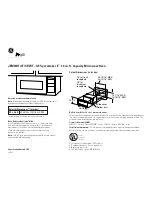
7
9.
Meat Thermometer.
Use a meat thermometer to check the
degree of cooking of roasts and poultry
only when meat has been removed from
the microwave. If undercooked, return to
the oven and cook for a few more
minutes at the recommended power
level. Do not leave a conventional meat
thermometer in the oven when microwaving.
10.
Paper, Plastic.
When heating food in plastic or paper
containers, keep an eye on the oven due
to the possibility of ignition. Do not use
wire twist-ties with roasting bags as
arcing will occur.
Do not use re-cycled paper products, e.g.
Kitchen roll unless they say they are
specifically designed for use in a
microwave oven. These products contain impurities which may
cause sparks and/or fires when used.
11.
Reheating.
It is essential that reheated food is
served “piping hot”.
Remove the food from the oven and
check that it is “piping hot”, i.e. steam is
being emitted from all parts and any
sauce is bubbling. (If you wish you may
choose to check the food has reached
72
˚
C with a food thermometer – but
remember do not use this thermometer inside the microwave.)
For foods that cannot be stirred, e.g. lasagne, shepherds pie, the
centre should be cut with a knife to test it is well heated through.
Even if a manufacturer’s packet instructions have been followed
always check the food is piping hot before serving and if in doubt
return your food to the oven for further heating.
12.
Standing Time.
Standing time refers to the period at the
end of cooking or reheating when food is
left before being eaten, i.e. it is a rest
time which allows the heat in the food to
continue to conduct to the centre, thus
eliminating cold spots.
13.
Keeping Your Oven Clean.
It is essential for the safe operation of
the oven that it is wiped out regularly.
Use warm soapy water, squeeze the
cloth out well and use to remove any
grease or food from the interior. Pay
particular attention to the door seal area
and also the areas around the
microwave feed guide situated on the right hand side of the cavity
wall. The oven should be unplugged when cleaning.
14.
Grilling.
The oven will only operate on the GRILL function with the door
closed.
15.
Fan Motor Operation.
After using the microwave oven, the fan motor may operate to
cool the electric components. This is normal and you can take out
food even though the fan motor operates. You can continue using
the oven during this time.
16.
Utensils.
Before use check that utensils/containers are suitable for use in
microwave ovens.
17.
Babies Bottles and Food Jars.
When reheating babies bottles always
remove top and teat. Liquid at the top of
the bottle will be much hotter than that
at the bottom and must be shaken
thoroughly before checking the
temperature. The lid must also be
removed from babies food jars, the
contents must also be stirred or shaken before the temperature is
checked. This should be carried out before consumption to avoid
burns.
18.
Arcing.
Arcing may occur if a metal container has been used incorrectly,
if the incorrect weight of food is used, or if the accessories have
been damaged. Arcing is when blue flashes of light are seen in
the microwave oven. If this occurs, stop the machine immediately.
If the oven is left unattended and this continues it can damage the
machine.
You can continue to cook by GRILL OR CONVECTION ONLY.
19.
Maximum Weight on turntable.
The maximum weight that can be placed on the turntable is 5 Kg
(11lb) this includes total weight of food and dish.
Important Information – Read Carefully









































